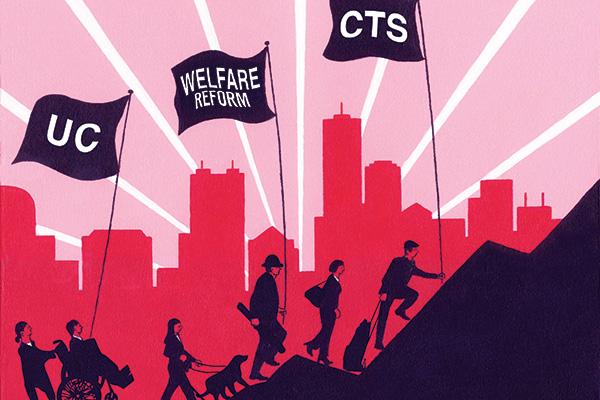By Peter Kenway | 30 September 2013
A revolution is taking place in welfare provision, but it’s not due to the long-awaited Universal Credit. Much more significant is local government’s introduction of Council Tax Support.

October 2013 IS CERTAINLY an important month for what the government has called ‘the biggest welfare revolution in over 60 years’. But is that thanks to Iain Duncan Smith’s Universal Credit policy? Or does the real significance of this month for welfare reform lie in other changes that are taking place elsewere?
Once upon a time, October was when the welfare secretary’s ‘Big Idea’ was going to go ‘live’. Instead of applying for one or more of a cocktail of old benefits such as Jobseeker’s Allowance or Housing Benefit, anyone who was out of work and making a new claim for means-tested support would make a single application for UC. Over the next four years, those already receiving the old benefits would gradually be transfiferred to UC.
Now that we are here, however, the reality is rather different. Instead of a full-scale introduction that would have affected around a half a million people making a new claim for out-of-work support each month, what is actually happening is that the pilot scheme that has been operating in four jobcentres across the UK since July is now being extended to ten – out of a total of some 740 across Britain.
Meanwhile, the National Audit Office has taken the wind out of UC’s sails by describing it as ‘overambitious’ and poor value for money. In fact, the pre-launch pilots only apply to single adults who would previously have claimed JSA alone, and no other benefit. UC’s unique selling point – that it replaces a multiplicity of benefits with just one – is not even being tested yet.
This more cautious approach is welcome. By definition, anyone who is short enough of money to be entitled to means-tested benefits is very short of money indeed, so getting it right the first time is vital. People whose only income is £71.70 a week from JSA have got nothing to fall back on, and cannot afford for the system to make a mistake.
There is certainly an argument that UC has been overhyped. In its name alone it is guilty of overreach, since the claim to universality can only be sustained by forgetting about the non-means-tested elements of the benefits system, notably the contributions-based elements paid for through national insurance.
More fundamentally, the dramatic change in appearance – with a single benefit replacing several – may be less important than the continuity beneath the surface. Another aspect of the October UC rollout includes what the government calls the ‘cultural transformation’, including the ‘claimant commitment’ and enhanced job-search support. These aspects are being extended across the country in October, and the benefits to which they apply are necessarily the old ones. By borrowing from the guts of UC, the old system is being reformed rather than replaced by something new.
So does this mean that there really hasn’t been a welfare revolution? After all, ‘revolution’ is a big word. In fact, 2013 has seen a change that represents a deep-enough rupture with 65 years of the welfare state to merit the label. It began in April. By October, we are into its second act. This is the switch from Council Tax Benefit to Council Tax Support.
There is no reason why there should not be some degree of local variation within the benefits system. But whether the degree of local variation seen in CTS is sensible is another matter. Neither is this an historical point about the decisions councils took last April. Unlike UC, or the national benefit system in general, systems remain in place for many years once introduced. Perhaps that may eventually be true of CTS, too, but it certainly is not now. The reason why we are already into a second act is because the transition grant funding for CTS was only for one year.
The NPI has been polling the 195 local authorities that received the transitional grant to see how many were planning to change their scheme in April 2014 when it runs out. Based on the answers received so far, it looks like one-quarter are denitely going to change, while one-quarter will not – and the remaining half may change, but have not yet made up their minds.
One effect of the transitional grant was that it put some limits on the extent of variation among the different CTS schemes. Although it is probably unlikely that any of those authorities will opt in 2014 for a scheme that is more extreme than anything seen in 2013, the ending of the grant may well lead to an increase in the overall level of variation – including, perhaps, between adjacent authorities.
Why would this matter? Not least of the reasons is that variation and complexity make it harder for people to grasp what they are entitled to. It also makes the job of advisory services like Citizens Advice much more difficult and costly to deliver. CTS, like national benefits, is ultimately a right: if you meet the conditions, you are entitled to the support. Variation that creates uncertainty and complexity undermines that right.
However, there are also reasons from local authorities’ point of view. Although local design may be the most obviously ‘revolutionary’ feature of CTS, the one that may matter most is the way the funding of CTS shifts risk from the national level to the local. And if this shift to localisation – rather than the implementation of UC – is the real revolution quietly taking place, it means the real revolutionary is not Iain Duncan Smith, but Communities Secretary Eric Pickles.
Under CTB, if, say, a factory closure caused an increase in CTB claims, central government would have ultimately picked up the tab. Under CTS, by contrast, this tab gets picked up locally – whether through a hit on the local authority’s finances, or ultimately, through higher council tax.
This shift, driven by the switch in central government funding for CTS from being part of Annually Managed Expenditure to grant funding, means that it is now in the financial interests of local authorities and the majority of their residents to have as few CTS claimants in their area as possible. This was not the case under CTB.
The creation of a direct opposition of interest between the poor and the rest is profound. From an economic point of view, it feels wrong – risks should be borne at the centre, on the strongest shoulders, and by taxpayers in general. But when this tension is combined with local design, the combination is potentially dangerous.
The introduction of residency requirements for CTS claimants by a handful of authorities in April means that this is not just a theoretical point – although these are still very much the exception, and perhaps will remain so. But should the practice catch on, the danger is that local authorities may feel compelled to limit entitlement and reduce support more generally in order to evade the adverse financial consequences of being known as a soft touch. To avoid this, local authorities may need to work together to agree on voluntary minimum standards, as without a consensus, this could end up – ironically – by obliterating all local variation.
If it were just CTS, then perhaps adverse outcomes like these could come to pass, yet still be too small to really matter. But there is another possibility. The experience of UC may make central government think again about ‘Big Bang’ national reforms, while the localisation trail being blazed by CTS may be seen as that much more attractive.
Not only can the financial risks for central government be sloughed off in this way, but so too can the political ones. The implications of that could be really radical.
Peter Kenway is director of the New Policy Institute
This feature was first published in the October edition of Public Finance Magazine



















